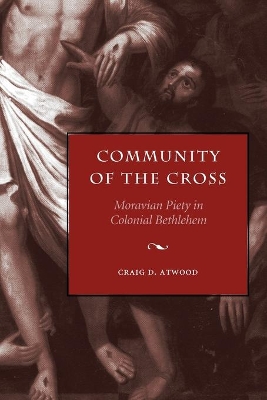Bethlehem, Pennsylvania, was a unique colonial town. It was the first permanent outpost of the Moravians in North America and served as the headquarters for their extensive missionary efforts. It was also one of the most successful communal societies in American history. Bethlehem was founded as a "congregation of the cross" where all aspects of personal and social life were subordinated to the religious ideal of the community. In Community of the Cross, Craig D. Atwood offers a convincing portrait of Bethlehem and its religion.
Visitors to Bethlehem, such as Benjamin Franklin, remarked on the orderly and peaceful nature of life in the community, its impressive architecture, and its "high" culture. However, many non-Moravians were embarrassed or even offended by the social and devotional life of the Moravians. The adoration of the crucified Jesus, especially his wounds, was the focus of intense devotion for adults and children alike. Moravians worshiped the Holy Spirit as "Mother," and they made the mystical marriage to Christ central to their marital intimacy. Everything, even family life, was to be a form of worship.
Atwood reveals the deep connection between life in Bethlehem and the religious symbolism of controversial German theologian Nicholas von Zinzendorf, whose provocative and erotic adoration of the wounds of Jesus was an essential part of private and communal life. Using the theories of Rene Girard, Mary Douglas, and Victor Turner, Atwood shows that it was the Moravians' liturgy and devotion that united the community and inspired both its unique social structure and its missionary efforts.
- ISBN10 0271058552
- ISBN13 9780271058559
- Publish Date 15 September 2012 (first published 24 March 2004)
- Publish Status Active
- Publish Country US
- Imprint Pennsylvania State University Press
- Format Paperback (US Trade)
- Pages 296
- Language English
